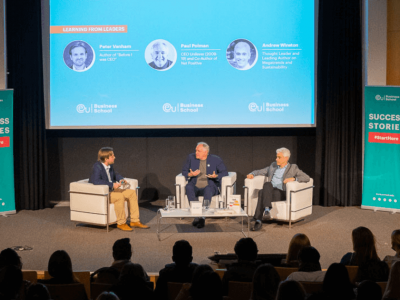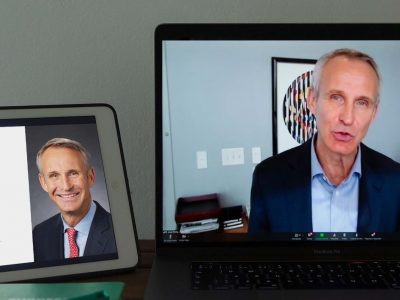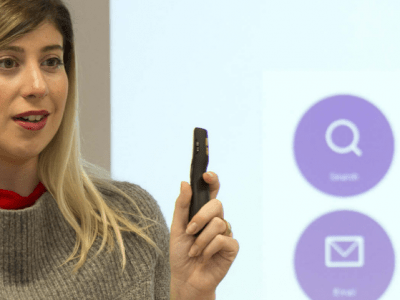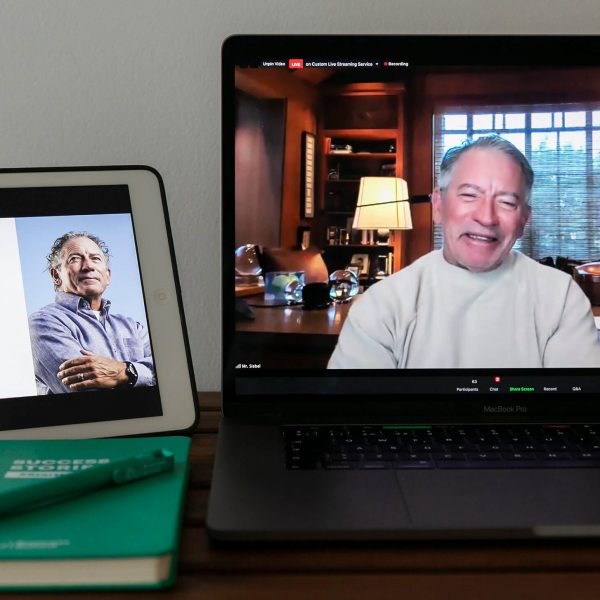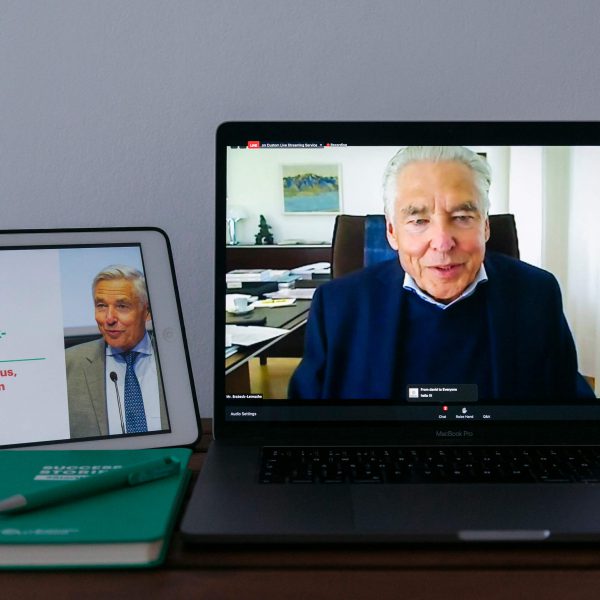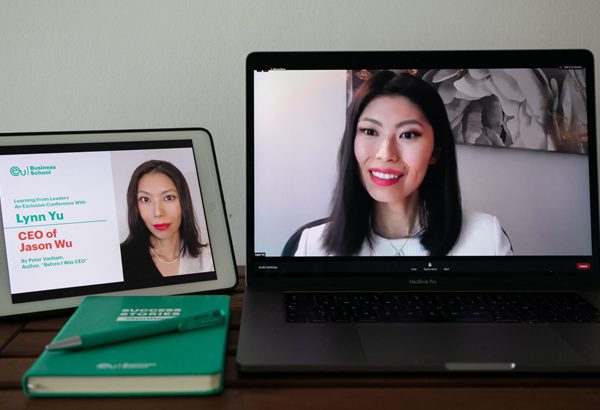Insights From Rick Goings, Former Chairman and CEO of Tupperware Brands
In the second of our Learning From Leaders conferences held virtually, Rick Goings, Former Chairman and CEO of Tupperware Brands, was interviewed by Peter Vanham, author of ‘Before I Was CEO’.
Speaking from Virginia in the U.S.A., Rick shared anecdotes and reflections from his long and impressive career. His conversation with Peter illuminated a path to leadership success for our students and explored what the future may look like post COVID-19. Unsurprisingly for a man who keeps a moleskin ‘playbook’ of the things he would have done differently, Rick drew on a broad arc of experience to offer a wealth of useful advice and tangible examples to EU students and guests. If you missed the event, you can watch it in full here. In this blog, we review some of the most pertinent and useful insights from the conversation.
Searching for Purpose
What makes the story of Rick Going’s rise to meteoric business success all the more impressive is the fact that he was not affluent or typically successful at the outset of his career. Rick illustrated his low self-esteem by candidly describing himself as “the second-shortest kid in in my high school graduating class, with an eye that turned in”. And, as he couldn’t afford to go to college, Rick went straight to work.
Somewhat ironically, considering he became the CEO of the most prestigious direct selling company in the world, Rick spent three months going door to door selling encyclopedias and didn’t make a single sale – he was terrible at it. However, behind one of the doors he knocked on was a kind man who saw his potential and advised Rick to join the navy.
During training he was made platoon leader and “all of a sudden I’ve got a hundred guys reporting to me and my voice hadn’t gotten deep yet. But they listened to me”. Rick realized that he had leadership ability; providing guidance to members of his platoon was something he was good at. A navigator, Rick spent most of his active service in the bridge of the ship with the Captain and senior crew. During that time, he decided who he wanted to be and how he wanted to act; he left the navy with a plan and went to college, financed by the military.
Being in the navy was a formative experience, giving Rick the confidence to pursue his dreams and a model of behavior to emulate. He also cited his jobs as a golf caddy and at prestigious mens’ clothing stores as invaluable experiences that formed his approach to service and his understanding of people. He paid attention to how people around him acted and emulated them, recognizing that replicating the behaviors of the rich and successful people he encountered would help him on his path.
An Enterprising Mindset
While studying, Rick started a company selling fire alarms – he’d noticed a gap in the market and the business took off. Eventually he quit college because he didn’t have time to study anymore. The company was successful for several years until legislation was passed that required fire alarms to be installed in every household. Overnight they became a commodity, much bigger companies started to manufacture the devices and the profit margin disappeared. Recognizing defeat Rick managed to sell the company, but not for much.
Undeterred, Rick set up his next enterprise: the ‘Fortunate Life Centers’ gyms. Using a franchise model he expanded the brand, selling 250 franchises from just one open center. However, he quickly learned that weight loss was a first-quarter-only business, with memberships and attendance driven by New Year resolutions quickly dropping off as the year progressed. In the second year he closed most of the branches and liquidated his holding.
Sales Success
Rick’s next move was to New York to work for Avon. Worries about finding himself amongst far cleverer people quickly disappeared when he realized that his experience actually gave him a competitive edge over other candidates; he had been a general manager and had a broad practical understanding of business.
Rick relished the adventure working for Avon; his seven-year career there moved him to Munich as President of Avon Germany and to China as Senior Operating Officer for the Pacific Rim. Finally, he was promoted to President of Avon U.S.A.
In 1992, Rick joined Tupperware as President and immediately turned the attention of the company to overseas markets. Drawing on the insights that had helped him to turn around Avon, Rick focused on growing the business in developing countries where the opportunity to earn an independent income would enable women to support their families. Rick also knew Avon’s association with quality was key to its success. He invested in research and development and moved the Tupperware brand towards high-tech products and away from basic (read ‘unexciting’) kitchenware necessities. Rick’s strategy was extremely successful – in 2010 shares rocketed 160% and every 2.3 seconds a Tupperware party was being hosted somewhere in the world.
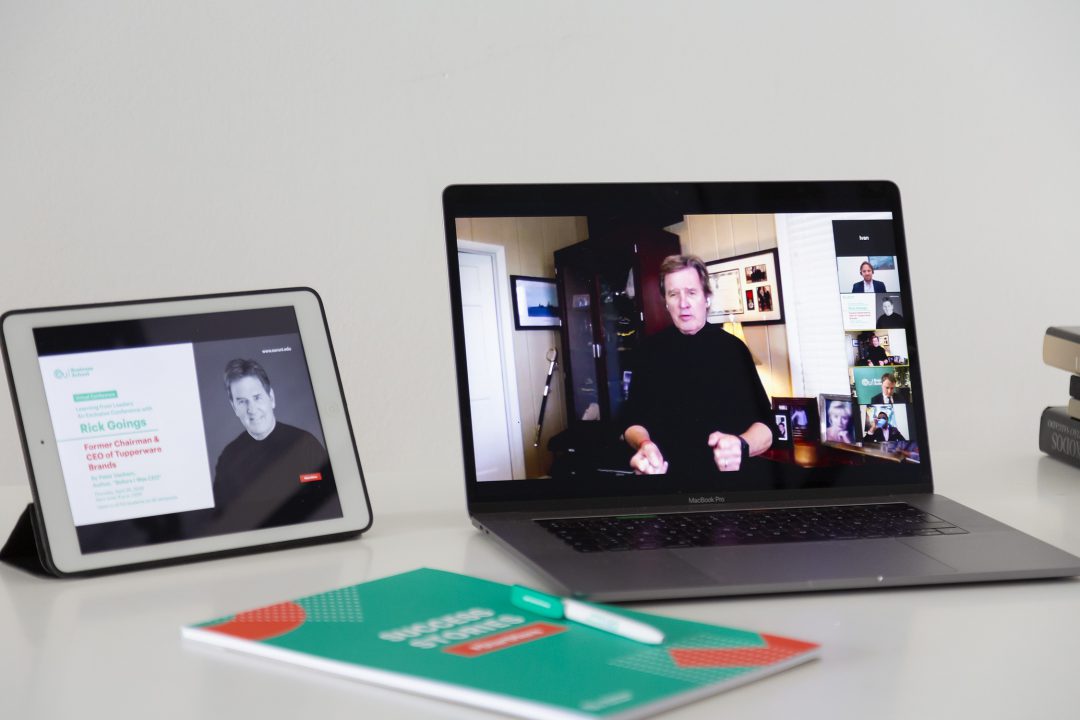

The Future of Direct Sales
Contrary, perhaps, to popular opinion, Rick sees a future for direct selling. Even though the concept of a Tupperware party feels old fashioned, he believes that the flexibility of working for a company like Tupperware has a strong appeal for today’s young people; “50% people born after 1990 don’t want a traditional job.” Rick asserted that the emerging workforce is likely to choose work that doesn’t pin them in a fixed place. He added that as 80% of millennials do not believe in advertising, direct selling, which is fundamentally about sharing, is a more logical approach to target the younger market. And this is, arguably, the approach of social media influencers who build a trusting community and make personal recommendations, earning their living through sales commissions and brand partnership deals.
What’s Next: Business Post-Coronavirus
With the accumulated wisdom of a long career, Rick shared some of his insights on the future of business, considering the ‘long tail effects’ that COVID-19 will have.
For eager future entrepreneurs, crisis offers opportunity. Rick highlighted two trends to demonstrate to EU students the analytical and strategic thinking they’d need to exercise to get ahead in business.
- Further education has been forced online and both institutions and students have come to realize the appeal of this route. For students facing huge debt, the lower cost of online learning may prove an irresistible option in the future.
- Social stimulation has been harder to come by during lockdown and again this offers space for innovation; a recently launched online bingo company, for example, has successfully capitalized on this lack. Given that large-scale gatherings are likely to be impossible until the release of a vaccine, the sporting and music industries will have to re-think the experiences they offer their audiences.
Above all, Rick encouraged students to be creative: “People think we’re going back to the same world we left. Wrong! It’s going to be different.”
Commenting on the future of sales. Rick warned that e-commerce is currently a very crowded space and one in need of anti-trust legislation to re-introduce competition to the market – companies like Amazon are currently pushing out all others. A multi-channel approach, he advised, offers the surest route to success.
Speaking from Kosovo, EU student Enkelejda Aliu asked Rick what impact he thinks artificial intelligence (AI) will have on business. Taking a refreshingly optimistic approach, Rick sees AI as an opportunity to enrich the individual experience, automating mindless processes and freeing people to do the things that only human intelligence and sense can accomplish.
Student Michelle Thompson asked Rick for his perspective on remote working; will it become the new normal? Given the incredible boost in productivity, Rick expects to see an increase in remote working and in digital meetings, saving valuable hours that would have been spent on commuting and business travel.
Surviving a Crisis
This, reflected Rick, “is the first time in living memory that the same impact is being felt all over the world.” In the search for a useful parallel from which to draw lessons, Rick highlighted the 2004 tsunami.
At the time, Tupperware had a considerable salesforce in Indonesia and the most important thing had been to put their people’s safety and health first. “We were there first and they never forgot that”, Rick commented. Crises are a test of company values – the response, Rick advised, should always be values first. Even businesses facing financial difficulty should put ethics first: “Doing what’s right is not an economic decision, it’s a values decision.” And he emphasized that “Leaders have to be ready. You need to have a contingency plan, always.”
For existing businesses, the ability to adapt has proven crucial to survival. And this unexpected turn will offer insightful leaders many opportunities to learn and grow. This matched the advice Rick gave EU International Business Management student Mohit Paul who asked what the most essential skills would be post-coronavirus. “You have to flexible and nimble. You have to be able to think about what you have and work out what your competitive advantage will be for the future.” That sage advice is true for companies and individuals alike.
Lessons From A Leader
Throughout the conversation Rick shared insights and advice accumulated from many years of experience. Here are some of the most valuable tips to get ahead.
Life should be an adventure. Say yes to different experiences and assignments.
Rick’s advice that enjoying life and work is fundamental echoes that of Ronnie Leten, who was a prior guest on our prestigious Learning From Leaders series. Diversity of experience is an essential part of the joy of life.
Find out what you’re good at and find your bliss.
Rick’s career advice for EU students encouraged them to try different things and work out what suits them. He repeated advice he recently gave his son; “Don’t start your own thing first because you’re going to be the smartest person in the room.” Spend time working at a big company to benefit from the expertise of others.
When you make money, put it away, don’t spend it.
Rick recalled one of his college professors telling him that you’re only really worth the money you have when you’re not working. Crises like coronavirus highlight how important it is both for individuals and businesses to take this approach, to think about the long-term and put away earnings so there’s always a safety net.
I believe very much in mindfulness and being in the present.
Rick doesn’t hold onto regret or longing but focuses on the challenge at hand and does all he can to maximize every experience. He thinks of life as a series of bridges and espoused Steve Jobs’ famous maxim about connecting the dots.
You can’t connect the dots looking forward; you can only connect them looking backward. So you have to trust that the dots will somehow connect in your future. You have to trust in something – your gut, destiny, karma, whatever. This approach has never let me down, and it has made all the difference in my life.
Steve Jobs
Learning Success
Finishing on a note of optimism, Luc Craen, Managing Director and Vice President of EU Business School, closed the event and thanked Rick for sharing his wealth of knowledge with the EU community.
The Learning From Leaders series will continue with the next exclusive virtual conference on May 12th featuring Jean-Claude Biver, LVMH Group, Non-Executive President of the Watch Division, Chairman of Hublot & Zenith Watches, who will be interviewed by Peter Vanham.
This event series offers EU students invaluable insights from businesspeople across industries and is a core element of our pragmatic approach to business education. Course curricula at EU provides theoretical understanding alongside a practical awareness of how to apply knowledge for career success.




